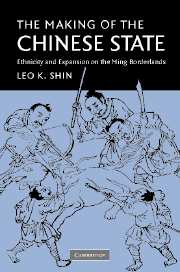Book contents
3 - Politics of chieftaincy
Published online by Cambridge University Press: 15 December 2009
Summary
The reason the people of Jiao [Annam] … dare not to encroach on the interior [of the Ming territory] is that the superior military force of the native chiefs is fully capable of placing a stranglehold on [any intruders]. If we were to weaken our defense and remove our buffer, it is feared that the troubles at the border of the central dominion [zhong guo] would be even greater than those brought by the native domains.
General Gazetteer of Guangxi (1599)In the autumn of 1368, a special proclamation was sent by the Ming founder to the native chieftains and peoples of Guangxi. With this decree the Hongwu emperor obviously had two goals in mind: to affirm his claim over the border zone, and to confirm the allegiance of the region's chieftains. In the edict, the Ming ruler first compares himself to the “wise men and kings of the past” who, in his view, were able to induce “submission from far and wide” because they understood how to “dispense both fear and generosity.” To demonstrate his own munificence, the Hongwu emperor expresses his appreciation for the “simple ways of life” of the borderland population and for those chieftains who have stepped forward to submit to the new dynasty. “The sincerity of your admiration [for the Ming],” the ruler declares, “indeed deserves high praise.”
- Type
- Chapter
- Information
- The Making of the Chinese StateEthnicity and Expansion on the Ming Borderlands, pp. 56 - 105Publisher: Cambridge University PressPrint publication year: 2006



